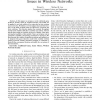1059 search results - page 2 / 212 » Modeling Security Protocols as Games |
NOSSDAV
2009
Springer
13 years 12 months ago
2009
Springer
Peer-to-peer distributed virtual environments (DVE's) distribute state tracking and state transitions. Many DVE's - such as online games - require ways to fairly determi...
CRYPTO
2006
Springer
13 years 9 months ago
2006
Springer
This paper presents the first automatic technique for proving not only protocols but also primitives in the exact security computational model. Automatic proofs of cryptographic pr...
GLOBECOM
2008
IEEE
13 years 11 months ago
2008
IEEE
—In this paper, we propose a novel coalitional game model for security issues in wireless networks. The model can be applied to not only mobile ad hoc networks but also wireless ...
ATAL
2005
Springer
13 years 11 months ago
2005
Springer
Tuple spaces and the associated Linda language are a popular model for distributed computation, and Law-Governed Linda (LGL) is a variant allowing processes to have differential ...
JSAC
2008
13 years 5 months ago
2008
If a network is to operate successfully, its users need to collaborate. Collaboration takes the form of following a network protocol and involves some resource expenditure on the p...


